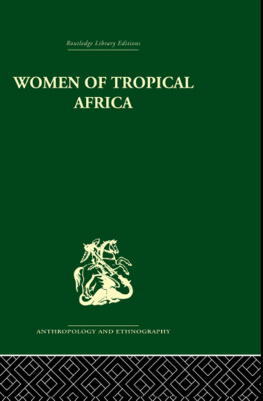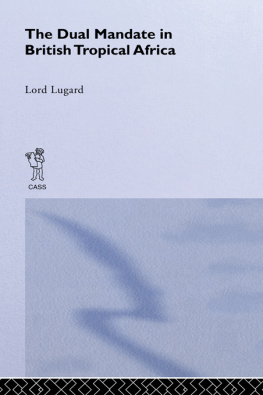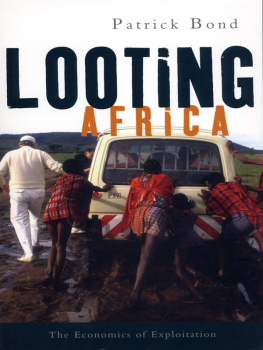AFRICAN ETHNOGRAPHIC STUDIES
OF THE 20TH CENTURY
Volume 44
THE NEW ELITES OF
TROPICAL AFRICA
THE NEW ELITES OF
TROPICAL AFRICA
Edited by
P. C. LLOYD
First published in 1966 by Oxford University Press for the International African Institute.
This edition first published in 2018
by Routledge
2 Park Square, Milton Park, Abingdon, Oxon OX14 4RN
and by Routledge
711 Third Avenue, New York, NY 10017
Routledge is an imprint of the Taylor & Francis Group, an informa business
1966 International African Institute
All rights reserved. No part of this book may be reprinted or reproduced or utilised in any form or by any electronic, mechanical, or other means, now known or hereafter invented, including photocopying and recording, or in any information storage or retrieval system, without permission in writing from the publishers.
Trademark notice: Product or corporate names may be trademarks or registered trademarks, and are used only for identification and explanation without intent to infringe.
British Library Cataloguing in Publication Data
A catalogue record for this book is available from the British Library
ISBN: 978-0-8153-8713-8 (Set)
ISBN: 978-0-429-48813-9 (Set) (ebk)
ISBN: 978-1-138-58982-7 (Volume 44) (hbk)
ISBN: 978-0-429-49112-2 (Volume 44) (ebk)
Publishers Note
The publisher has gone to great lengths to ensure the quality of this reprint but points out that some imperfections in the original copies may be apparent.
Disclaimer
The publisher has made every effort to trace copyright holders and would welcome correspondence from those they have been unable to trace.
THE NEW ELITES
OF TROPICAL AFRICA
STUDIES PRESENTED AND DISCUSSED
AT THE SIXTH INTERNATIONAL AFRICAN SEMINAR
AT THE UNIVERSITY OF IBADAN, NIGERIA, JULY 1964
Edited with an Introduction by
P. C. LLOYD
Foreword by
DARYLL FORDE
Published for the
INTERNATIONAL AFRICAN INSTITUTE
by the
OXFORD UNIVERSITY PRESS
1966
Contents
Oxford University Press, Walton Street, Oxford OX 2 6 DP
OXFORD LONDON GLASGOW
NEW YORK TORONTO MELBOURNE WELLINGTON
IBADAN NAIROBI DAR ES SALAAM LUSAKA CAPE TOWN
KUALA LUMPUR SINGAPORE JAKARTA HONG KONG TOKYO
DELHI BOMBAY CALCUTTA MADRAS KARACHI
International African Institute 1966
ISBN 0 19 724203 0
First published 1966
Reprinted 1970
Reprinted in paperback 1977
Printed in Great Britain by
Clarke, Doble & Brenden Limited
Plymouth & London
This volume brings before a wider audience the studies presented and the trends of discussion at the International African Institutes Sixth Seminar on the New Elites of Tropical Africa, which was held at the University of Ibadan, Nigeria, in July 1964.
The eighteen papers, in English or French, each with a summary in the other language, deal with aspects of the emergence and development of modern elites in West, East, and Southern Africa. They provide data and present problems for study with regard to a wide range of social categories, from commercial farmers and women market traders to foremen and merchants, as well as administrators and managers in government and industry. Such features as the sharp contrasts with traditional patterns in style of life and aspirations, the development of class consciousness, and attitudes towards marriage and family life are analysed in the context of technical and economic change. A comprehensive introduction by Dr. P. C. Lloyd, based on the discussions at the seminar and his own studies in this field, provides a comparative review. It portrays the characteristics and variations of contemporary elites in Africa, their development in relation to educational advance, their part in traditional and modern associations, the evidence for achievement motivation, and the relationships between the elite and the uneducated. Future developments in African states will clearly be influenced by the composition and character of their elites, and the importance of reaching a deeper understanding of their emergence and of studying the trends of development make this collection of studies particularly relevant at the present time.
The International African Seminar programme as a whole has been made possible by generous grants from the Ford Foundation and we should like again to express our thanks for this assistance. Our thanks are also due to Dr. K. O. Dike, Vice-Chancellor of the University of Ibadan and Director of the Institute of African Studies, for receiving the Seminar, and to Dr. P. C. Lloyd, who devoted so much time and thought to it as Chairman and in editing this volume. We are also indebted to Mr. Michael Crowder, then Secretary of the Institute of African Studies, Mr. Elochukwu Amucheazi, Assistant Secretary, and other members of the staff who were responsible for the practical arrangements.
D ARYLL F ORDE
THE STUDY OF THE ELITE
Throughout sub-Saharan Africa political power has been rapidly passing from the colonial rulers to members of indigenous national elitesmen who are predominantly young, highly educated and comparatively wealthy. This process is being documented and analysed by the political scientist. We have descriptions of the rise of political parties, the stages in the contest for independence, the ideologies of the nationalist leaders. We know the biographies of the political leaders; but we still know very little about the social milieux to which these men belonga category today described in the English-speaking territories as the elite but termed only a decade ago, the middle class. (In the French-speaking countries the term volu has likewise suffered an eclipse.) It is nevertheless clear that future political developments in African states will be strongly influenced by the composition and characteristics of the elites, and the degree of their cohesiveness on internal rivalries.
Social research in Africa has been dominated by anthropologists interested more in community studies related to traditional societies than in the social categories increasingly relevant to the modern industrial and commercial towns. The migrant, adapting the norms and values of his village to those dictated by the urban environment, has attracted more attention than the secondary school and university educated youth increasingly divorced from his traditional culture. Studies of the new elite are also fraught with practical difficulties: its members are busy men and few in number, not readily available for interview; their lives are spent not in the open air but in offices, homes, and clubs; car-owners, their homes are often scattered across the town forming no recognizable territorial community. Thus, the I.N.C.I.D.I. (1956) conference on the middle class in developing territories and the U.N.E.S.C.O. (1956) symposium on African elites seem to have given little impetus to sociological studies in this field. So far, we have but few monographs devoted to an African elite (e.g. Kuper, 1965; Levine, 1965; Porter, 1963; Smythe and Smythe, 1960; Tardits, 1958); articles in sociological journals are more numerous, but tend to be somewhat limited to studies of family patterns and relationships and to political attitudes and aspirations.











